|
|
|
Sort Order |
|
|
|
Items / Page
|
|
|
|
|
|
|
| Srl | Item |
| 1 |
ID:
167810
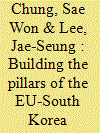

|
|
|
|
|
| Summary/Abstract |
This paper explores the evolution of the policy agenda of the EU-South Korea strategic partnership, based on key pillars of cooperation: politics, security, and economics. In the political arena, the Framework Agreement has provided a major platform for promoting EU-Korea political dialogue and developing a common stance toward a shared global agenda. When it comes to security, the main agenda involves North Korea’s missiles, nuclear program, and the challenge of nonproliferation; the two parties have coordinated sanctions against North Korea. South Korea has enacted a Crisis Management Participation Agreement (FPA) with the EU and begun to participate in the EU common security and defence policy. The changing security environment on the Korean Peninsula, as a consequence of recent inter-Korean and US-North Korea dialogues, may offer the EU new opportunities for constructive engagement. In the economic arena, the EU-Korea FTA has established solid trade and investment relations. While these pillars of the strategic partnership have led to stable and mature bilateral relations, both the EU and South Korea need to find new momentum for an enhanced partnership to deal with the ongoing challenge of global security instability and the backlash against the liberal international order. The EU-South Korea strategic partnership also needs a global agenda that covers climate change, technology, education, and culture. This study assesses the development of each pillar of the strategic partnership, addressing key challenges, tasks, and future diplomatic developments between the EU and South Korea.
|
|
|
|
|
|
|
|
|
|
|
|
|
|
|
|
| 2 |
ID:
099688
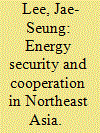

|
|
|
|
|
| Publication |
2010.
|
| Summary/Abstract |
The importance of Northeast Asian energy cooperation has been consistently emphasized in recent years to cope with uncertainties in the global energy market and to avert potential conflicts regarding energy supply among consumer countries. Energy supply, climate change, and the North Korean energy crisis have posed major concerns with respect to the energy security of Northeast Asian countries. However, the actual implementation of energy cooperation has reflected strong competition among major energy consuming countries, despite the perceived necessity of energy cooperation. Energy cooperation in Northeast Asia has become essential-not only for the facilitation of energy supply but also for the prevention of potential conflicts stemming from competitive energy procurement. This paper proposes that intergovernmental energy cooperation in Northeast Asia should focus more on the aspect of public goods. Intergovernmental energy cooperation should be based on a practical and achievable "soft agenda" rather than a "hard agenda" of large-scale supply projects. Successful energy cooperation in Northeast Asia needs a careful reconsideration of the agenda-setting and the modality of cooperation in terms of scope, membership, and issue linkage. The case for regional energy cooperation could be guaranteed if participating countries were to move together toward a virtuous circle of energy cooperation out of neo-mercantilist competition. Confidence-building measures to ease the escalation of conflicts regarding energy supply may also be an important basis for further energy cooperation.
|
|
|
|
|
|
|
|
|
|
|
|
|
|
|
|
| 3 |
ID:
106247
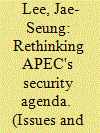

|
|
|
|
|
| Publication |
2011.
|
| Summary/Abstract |
In the aftermath of the September 11, 2001, terrorist attacks, the Asia-Pacific Economic Cooperation (APEC) organization expanded its agenda to incorporate counter-terrorism and human security concerns. While the inclusion of security issues has broadened APEC's policy agenda and successfully maintained the visibility of the organization, it has also resulted in functional overlapwith other Asia-Pacific regional institutions. As the functional expansion of APECchanged its nature from an economiccentered institution to a broader-focused one, APEC's agenda has been losing its distinctiveness vis-à-vis ASEAN+3 and various other regional institutions. Furthermore, the expansion of the APEC agenda has not been accompanied by a sufficient enhancement of its institutional structure. To cope with these challenges, APECneeds to clarify the scope and value of its security agenda and engage in inter-institutional coordination with other regional institutions to maintain its utility and salience in the Asia-Pacific region.
|
|
|
|
|
|
|
|
|
|
|
|
|
|
|
|
| 4 |
ID:
123593
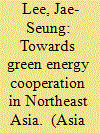

|
|
|
|
|
| Publication |
2013.
|
| Summary/Abstract |
Faced with the dual challenge of depletion of fossil fuels and climate change, three Northeast Asian countries-China, Japan and Korea-introduced green energy initiatives in recent years. Even though the portion of renewable energy in the energy mix has been limited, a rapid shift to green initiatives has given a strong boost to renewable energy resources. Cooperation with respect to green energy in Northeast Asia (NEA) may eventually overcome the geopolitical constraints and zero-sum nature of the fossil fuel supply in the region. However, this cooperation also faces a number of obstacles to be overcome. Energy cooperation in NEA is still in an embryonic stage, and the level of institutionalisation is low. Green energy cooperation is not free from neo-mercantilist competition either, as the current green initiatives entail elements of strong industrial policy. European experience may shed light on the burgeoning green energy cooperation in NEA, in terms of methods and scope. The EU is currently adopting the most advanced policies on renewable energy and climate change. A series of green energy initiatives has provided a concrete platform for further green energy cooperation that could be pursued at the Union level. On the other hand, the history of European energy cooperation indicates that a long stage of market integration, institutional development and policy coordination are prerequisite. Northeast Asian green energy cooperation should be based on a continued momentum of green initiatives at the domestic level as well as the advancement of sub-regional institutional build-up. Regional multilateral institutions, such as Asia-Pacific Economic Cooperation, Association of Southeast Asian Nations Plus Three and ASEAN Regional Forum, as well as diverse international organisations and Track II institutions can provide a useful venue for Northeast Asian countries to share information and adopt a common position towards green energy cooperation.
|
|
|
|
|
|
|
|
|
|
|
|
|
|
|
|
| 5 |
ID:
060645
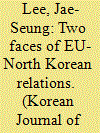

|
|
|
|
|
|
|
|